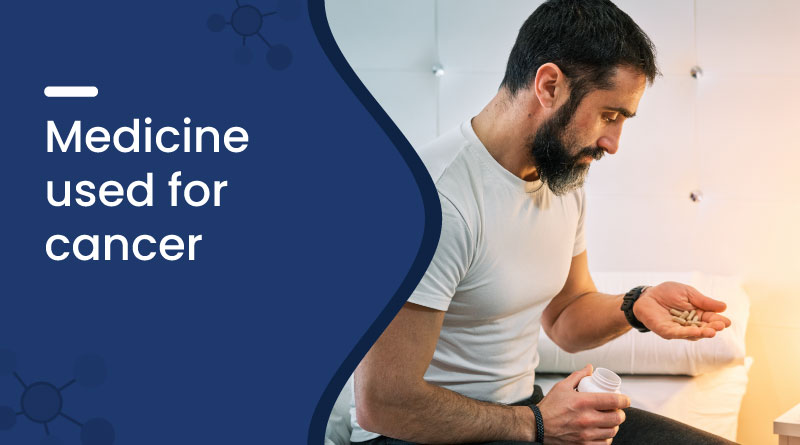Medicines Used for Cancer Treatment: Types & Uses


Cancer is one of the most challenging health conditions, affecting not just the body but also the mind and emotions. Bad cells grow wildly, harming normal tissues. Cancer can start in any part of the body, such as the breast, lungs, colon, blood, or prostate. If not treated on time, it can spread and become life-threatening. But with proper diagnosis and timely medicine, cancer can be managed, controlled, and even cured in many cases. Medicines used for cancer are specially designed to destroy cancer cells, stop their growth, and improve the patient’s quality of life. These medicines play a powerful role in helping patients recover and live better every day.
Why Use Medicine for Cancer?
Medicines are a key part of cancer treatment. They help reduce tumor size, stop the spread of cancer, and ease symptoms like pain, weakness, or fatigue. Cancer medicines are used alone or with surgery and radiation, depending on the type and stage of cancer. In early cases, they may cure the cancer fully. In advanced stages, they help control it and improve the patient’s comfort. Each cancer medicine is made to target the disease from the root, kill harmful cells, protect healthy tissues, and support the immune system. With expert guidance, the right medicine can make a big difference in the outcome and healing process.
Benefits of Using Cancer Medicines
- Prevent Cancer Cell Growth: Cancer medicines are designed to block or kill fast-dividing cancer cells. They stop the disease from getting worse and help in shrinking tumors in various organs of the body.
- Target Cancer Cells: Cancer medicines like targeted therapy work directly on cancer cells without harming normal cells. This focused action reduces side effects and increases treatment success.
- Boosts the Immune System: Some medicines, like immunotherapy, strengthen your natural immune system to fight and kill cancer cells. They make your body smarter and stronger against cancer.
- Reduces Symptoms and Pain: Cancer often causes pain, swelling, and fatigue. Medicines help control these problems, making the patient feel more comfortable, mobile, and active during treatment.
- Prevents Disease Recurrence: After surgery or radiation, medicines kill any remaining cancer cells. This lowers the risk of cancer coming back and gives long-term protection.
- Improves Overall Survival: Timely and suitable cancer medicines help improve survival rates by controlling the disease and supporting the body’s healing process over time.
List of Common Generic Salts Used in Cancer Treatment
| Generic Salt Name | Category | Common Use |
|---|---|---|
| Cisplatin | Platinum compound | Used in lung, ovarian, bladder, and testicular cancers |
| Carboplatin | Platinum compound | Ovarian, lung, head and neck cancers |
| Paclitaxel | Taxane | Breast, lung, ovarian cancers |
| Docetaxel | Taxane | Breast, prostate, stomach cancers |
| Doxorubicin | Anthracycline | Breast, bladder, leukemia, lymphoma |
| Epirubicin | Anthracycline | Breast, ovarian, gastric cancers |
| 5-Fluorouracil (5-FU) | Antimetabolite | Colon, rectal, stomach, breast cancers |
| Capecitabine | Antimetabolite (oral 5-FU) | Colon, breast cancers |
| Imatinib | Tyrosine Kinase Inhibitor | Chronic myeloid leukemia (CML), GIST |
| Letrozole | Aromatase Inhibitor | Postmenopausal breast cancer |
| Anastrozole | Aromatase Inhibitor | Hormone-sensitive breast cancer |
| Tamoxifen | Selective Estrogen Receptor Modulator (SERM) | Estrogen receptor-positive breast cancer |
| Bevacizumab | Monoclonal Antibody | Colon, lung, kidney, brain cancers |
| Trastuzumab | Monoclonal Antibody | HER2-positive breast and gastric cancers |
How Do Cancer Medicines Work?
Cancer medicines work in different ways depending on their type. Chemotherapy kills cells that divide quickly. Targeted therapy blocks cancer cell signals and proteins. Immunotherapy activates your immune system to destroy cancer. Hormone therapy stops hormones that help cancer grow. These medicines may be used alone or in combination, based on the cancer’s location, size, stage, and how it reacts to treatment. The goal is always to stop the cancer, support the body, and improve the patient's chances of recovery.
How to Use Cancer Medicines?
- Dosage: Medicine doses are based on weight, age, cancer type, and health condition.
- Form: They may be given as pills, injections, or through IV drips.
- Schedule: Medicines are often taken in cycles over weeks or months.
- Monitoring: Regular blood tests and scans to check progress.
- Supportive Care: Other medicines may be used to control nausea, infection, and pain during treatment.
What to Avoid During Cancer Medicine Treatment?
- No Self-Medication: Always follow the doctor’s prescription and advice.
- Avoid Alcohol and Smoking: These lower immunity and interfere with treatment.
- Don’t Miss Doses: Skipping medicines can reduce their effectiveness.
- Avoid Infections: Stay away from crowds and unhygienic conditions due to weak immunity.
- No Herbal Products Without Advice: Some herbs may reduce the effect of cancer medicines.
Home Remedies to Support Cancer Recovery
- Turmeric Milk: Reduces inflammation and supports the immune system.
- Wheatgrass Juice: Detoxifies and boosts blood count.
- Amla Juice: High in vitamin C, it strengthens immunity naturally.
- Ashwagandha: Builds energy and reduces treatment-related fatigue.
- Dates and Almonds: Rich in iron and protein to rebuild strength.
- Flaxseeds: Have cancer-fighting omega-3s and support hormonal balance.
How to Choose the Right Cancer Medicine?
- Identify the Cancer Type: Different cancers need different medicines.
- Check Reports and Scans: Blood and biopsy results help choose the best treatment.
- Listen to the Oncologist: Only a cancer specialist can guide correct medicine choices.
- Evaluate Side Effects: Choose the treatment with the most benefit and manageable side effects.
- Availability and Cost: Choose medicines that are accessible and supported by your insurance or assistance plans.
When to See a Doctor?
- Uncontrolled pain, vomiting, or weakness during treatment
- Sudden weight loss, bleeding, or new lumps
- If side effects become unbearable or get worse
- No improvement in condition after multiple cycles
- Before starting or stopping any medicine or supplement
Conclusion
Cancer is a serious illness that needs timely treatment and the right medicine to control its spread. Delayed action can worsen the condition. Awareness, early detection, and proper medical care can save lives. Preventive steps, regular checkups, and expert guidance are key. Stay informed, choose trusted treatments, and fight cancer with strength, hope, and the right support system.
Frequently Asked Questions (FAQs)
Q: Can cancer medicines cure the disease?
A: In the early stages, yes. In advanced stages, they help control and manage symptoms.
Q: Are there side effects?
A: Yes, but supportive medicines are given to handle nausea, hair loss, and fatigue.
Q: Can I take Ayurvedic medicine with cancer drugs?
A: Only after your doctor’s approval. Some herbs interfere with cancer medicine.
Q: How long should I take cancer medicines?
A: Duration depends on the type and stage of cancer. It could be weeks or even months.
Recent Blogs
Disclaimer : Zeelab Pharmacy provides health information for knowledge only. Do not self-medicate. Always consult a qualified doctor before starting, stopping, or changing any medicine or treatment.
Related Products
Need Medicines Quick?
Share location to check quick delivery serviceability.
Change Location
Location Access Needed
Your location appears to be blocked or disabled.
Please enable the location from your browser or
device settings.

₹ 0
0
Items added
Quick Links
Categories
Our Policies
2026 Copyright By © Zeelab Pharmacy Private Limited. All Rights Reserved
Our Payment Partners

 Added!
Added!
|
|













